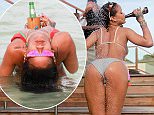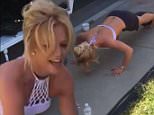EXCLUSIVE: 'Urgent! Emergency! My dive partner's been killed by a Great White': The radio call made after British grandmother died in a shark attack off Western Australia
- Doreen Collyer died after a shark attack while diving off Mindarie in Perth
- 60-year-old is from Chester but emigrated to Australia about five years ago
- Witnesses reported seeing a shark which was 'bigger than their 18ft boat'
- Her husband David paid tribute to 'lovely wife' who was a 'beautiful person'
- Diving partner made harrowing emergency call saying she had been killed

Grandmother Doreen Collyer, 60, who is originally from Chester, Cheshire, has died after a shark attack off the coast of Perth, Australia, on Sunday
The diving partner of a British grandmother killed by a shark off the coast of Western Australia made a harrowing emergency call to the coastguard just minutes after she was mauled by the great white.
The man, known only as John, made a desperate call to the rescue tower saying: ‘Urgent, emergency. My dive partner has been killed by a huge great white shark’ after Doreen Collyer was fatally attacked.
The 60-year-old grandmother-of-one, who is originally from Chester, Cheshire, had been diving at a reef off Mindarie Beach, about 35 kilometres north of Perth, when she was targeted by the shark on Sunday.
She was pulled from the water and put onto a fishing boat but died before she got to the shore.
Today, fisherman Neil Dawson told how he received the distressing rescue call from John, 43, who phoned from his diving boat just minutes after Mrs Collyer, a university lecturer, was attacked.
Mr Dawson said: ’He sounded quite composed, given the circumstances. He was able to give quite a good, legible and rational call.
‘He said words to the effect of: “Urgent, emergency. My dive partner has been killed by a huge great white shark.’
John had phoned the Whitfords Volunteer Sea Rescue’s command tower to speak with crew in the area.
One of the rescue group’s boats was already near the scene having responded to an overturned boat earlier in the day. It sent its fast response vessel, Green 2, to the boat where Mrs Collyer’s body had been pulled out of the water by her diving companion.
Mr Dawson said it was clear from the tower phone call that there was ‘no saving her’.
‘The understanding we had in the tower was that there was no saving her, there was no chance of survival due to the injuries she’d received,’ he said.
He added that John had been saved by a group of three fishermen, all aged in their twenties, who used their boat to block him from the shark while he pulled Mrs Collyer’s body out of the water.
Ron Harris, the rescue team’s commander, said they had done a ‘great job’ in ensuring he did not come to harm.
But the men have been left too shocked by the ordeal to speak of it publicly, Mr Harris said.
Scroll down for video

Mr Collyer (pictured at the scene following the attack on Sunday) has paid tribute to his 'beautiful, loving wife'

Mr Collyer (pictured above with paramedics on Sunday) said the pair – who have two children together and a granddaughter called Daisy – moved to Australia five years ago to be closer to their son and grandchild

Today, fisherman Neil Dawson told how he received the distressing rescue call from John, 43, who phoned from his diving boat just minutes after Mrs Collyer, a university lecturer, was attacked. Mr Dawson said: ’He sounded quite composed, given the circumstances. He was able to give quite a good, legible and rational call'
He described the incident as the most traumatic he had seen in 14 years of service, adding that he was providing counselling for the four crew members involved.
‘We've dealt with drownings and other accidents before but nothing on this scale of trauma. It was very traumatic - for her diving partner and for our rescuers.’
Yesterday, Mrs Collyer’s husband David paid tribute to his ‘beautiful, loving wife’ who he was due to celebrate his 30th wedding anniversary with this year.
He found out she was dead after seeing helicopters circling overhead as he drove to pick her up.
When he arrived at the boat yard he had to be told by paramedics that she had been killed by a shark described as being 'bigger than an 18ft boat'.
Paying tribute to her, he said the pair – who have two children together and a granddaughter called Daisy – moved to Australia five years ago to be closer to their son and grandchild.
Speaking from their home in Iluka, Perth, he said: 'Doreen was a beautiful person and everyone loved her, she was a devoted grandmother, mother and loving wife.'
He added: 'Doreen loved nursing, she was a passionate nurse and she was a fantastic teacher.
'She was a beautiful, wonderful person and she was very good at her job.
'She was loved by everybody and was very caring and loving. She was full of life and very active.
'She touched a lot of lives through her teaching and through her time working on the wards.'
Mr Collyer said his wife had been a keen swimmer in the UK, but fell in love with diving when they moved abroad. She had an advanced open water diver's certificate and used to dive up to four times a week in the summer.
He said: 'She was a very experienced diver and she loved diving. She used to go out every week as much as she could. It was something she really enjoyed.'
He added that it was the first time in weeks she had been out diving due to recent bad weather.

Mrs Collyer’s husband David paid tribute to his ‘beautiful, loving wife’ who he was due to celebrate his 30th wedding anniversary with this year. They are pictured together above celebrating their Australian citizenship

Mrs Collyer had been working as the Director of Postgraduate Studies and a lecturer with the School of Nursing and Midwifery at Edith Cowan University in Perth where colleagues described her as a 'amazing'

Mr and Mrs Collyer lived in this property in Iluka, Perth, after emigrating to Australia from Cheshire in England five years ago. Pictured outside the house in the boat Mrs Collyer took out to go diving on the day of the attack
Mrs Collyer and her diving partner had been to the reef where she was attacked about a 'dozen' times before. They were searching for crayfish and had only been in the water about 25 times when John felt the shark 'brush past them'.
He returned to the surface and realised Mrs Collyer – who he described as a 'phenomenal' diver – had been attacked. He tried to comfort her and bring her ashore, but she died while still at sea.
Her injuries were described as being 'apparent and severe' and consistent with a shark attack.
Footage later emerged of a 'huge' shark in the same stretch of water just 90 minutes after the attack. The video, taken by a fisherman, was filmed around an hour-and-a-half after Mrs Collyer was targeted - raising suspicions it may have been the same shark which attacked and killed her.
The footage, taken from a fishing boat, shows a large fin - typically that of a great white - roaming the waters just 400 metres off Mindari Marina. A voice can be heard saying: 'That was huge!'
Today, a shop assistant at the marina where she launched from described her as a ‘lovely lady’ with a passion for the ocean.
The man, who declined to be named, said he often saw her and her husband going out on to the water in the morning.
'It was kind of her hobby, she did it with her husband. She loved going diving,' he said.
Despite it being the second shark attack in Western Australia in two weeks, locals insist all those who dive in the area know the dangers of the water.
’Everyone knows the risks but it just happens so rarely.
'You're going in to their habitat,' added the marina store worker.
'The water is their zone and ours is the land.'
He lambasted local government initiatives to prevent attacks, namely drum lines which bait the sharks with large pieces of meat on hooks.
'Anything that goes in to those drum lines dies. I don't like them at all,’ he said.

Police said Mrs Collyer, who was dragged from the water by her diving partner John, had 'apparent and severe' injuries consistent with a shark attack. It was the first time she had been diving in weeks due to bad weather

Three men who came to Mrs Collyer's aid reported seeing a shark which was longer than their 18ft fishing boat
The Department of Fisheries placed three in the water on Sunday after the attack to try to track the shark but have since removed them.
They will not be put back in to the water, a spokesman said, until another sighting is reported.
Mrs Collyer had been working as the Director of Postgraduate Studies and a lecturer with the School of Nursing and Midwifery at Edith Cowan University in Perth.
She was born in Liverpool and grew up in Birkenhead before settling in Neston, on the Wirral, with her Chester-born husband. The pair lived in the area for more than 20 years while they brought up their two children.
The couple then moved to Australia five years ago after their marine engineer son Ben emigrated to the country with their granddaughter Daisy, then aged three, as they did not want to miss her growing up.
Their son still lives in Australia while their daughter, former England cricketer Sarah, lives in New Zealand but is currently based in Portugal.
Mr and Mrs Collyer were due to celebrate their 30th wedding anniversary this year and still have many friends and family in the UK, including Mrs Collyer's siblings.
She worked at Countess of Chester Hospital for many years as a specialist paediatric nurse and also taught nursing at the University of Chester for 15 years.
She held qualifications from the Fellow Higher Education Academy (FHEA), the Royal College of Nursing and Australian College of Children and Young People's Nursing (ACCYPN).
Meanwhile, her husband studied at the University of Leeds in England before working at a civil and structural engineering consultancy.
Professor Annette McIntosh-Scott, executive dean of the faculty of health and social care at the University of Chester, paid tribute to Mrs Collyer yesterday.
She said: 'The University of Chester and the Faculty of Health and Social Care in which Doreen worked for 15 years, are deeply saddened to hear of her death.
'Doreen was a hugely valued and loved member of staff.
'She will be remembered as someone with a real commitment and passion for teaching and child health care- her students were at the heart of all she did.
'Our heartfelt thoughts and prayers go out to her husband and family.'

Pictured is the rescue boat sent to the aid of John and Mrs Collyer after she was mauled by a shark on Sunday

Police were called at 11.50am and told that an injured person was found in the water off Mindarie, Australia

Deadly: Most great white shark attacks take place within 100ft of the shore and in water no more than 6ft deep
The Edith Cowan University in Perth also issued tribute to the 'much-loved and respected colleague, mentor and teacher'.
In a statement sent to staff, acting vice chancellor Professor Arshad Omari said: 'Having obtained an impressive record of senior clinical and lecturing experience in her native UK, upon migrating to Australia she made many valued contributions to ECU in the area of children and young people's nursing.
'On behalf of the entire ECU community, I extend my sincerest condolences to her family in what is a very difficult time.'
Others paid tribute to their 'kind and amazing' colleague with a string of posts on social media.
One wrote: 'Doreen was such a kind and supportive teacher. You will be missed by all, especially by your students.'
Another, Kelly Mills, added: 'RIP Doreen, you where an amazing lecturer, thank you for sharing your vast knowledge.'
And Nikki Vickers said: 'Condolences and deepest sympathy to all family, friends and colleagues from ECU Nursing and Midwifery.'
The news comes as Western Australia's Fisheries Department warned people to stay out of the water, closing 2km of beaches in the area as they hunt for the shark which attacked Mrs Collyer.
Fisheries officers have closed beaches and reset baited drum lines one kilometre off Mindarie marina.
Fisheries metropolitan regional manager Tony Cappelluti said it was the first time two fatal shark attacks had occurred in Western Australia waters within such a short period of time.
'From my recollection, we've had them maybe months apart but probably never several days apart,' he said.


A fisherman claims to have video footage of a huge shark in the same area as where Ms Collyer was killed just two hours after the attack. The shark's fin can be seen (centre left) and towards the top in the right-hand image
Mr Cappelluti said any shark caught in the wake of the female diver's death that fit the description of her attacker would be shot.
'If we catch a shark of the description and the type of shark that we believe may have been responsible - and like the Falcon incident, we believe it is a white shark of at least three metres in length ... then it is highly likely we will take the decision to destroy it in the interest of public safety,' he said.
'We have two methods: we can either let it expire on the line or we can use a firearm.
'In this instance, we'll be using a firearm.'
The deaths have reignited debate about WA's policy to catch and kill sharks deemed an imminent threat to public safety.

Mrs Collyer, who was diving off Mindarie Beach (pictured), was the Director of Postgraduate Studies and a lecturer with the School of Nursing and Midwifery at Edith Cowan University, having emigrated from England

If the injuries were inflicted by a shark it would be the second shark attack in the Perth area in a week

Less than half an hour before the suspected shark attack, Surf Life Saving WA reported a shark sighting
The attack came just days after a surfer had his leg bitten off by a shark while paddling his surfboard at Falcon Beach in his hometown of Mandurah, south of Perth, lastTuesday afternoon.
Ben Gerring, 29, was brought to shore by fellow surfers and taken to Royal Perth Hospital, but tragically died late on Friday night from the injuries.
An inspection of his damaged surfboard showed a white shark was responsible.
Western Australia's Department of Fisheries trapped and killed a 4.2 metre great white shark on Wednesday afternoon but don't know if it was the same shark that attacked Gerring.
The huge shark was caught on Wednesday afternoon and died on the drum line.
It was then towed out to sea and dumped after samples and measurements were taken.
The latest incident happened around 100km north of that attack.
State premier Colin Barnett said beaches patrolled for sharks were safe but he admitted it was impossible to protect all surfing areas or reefs.
If a shark was spotted and there was an imminent threat to the public 'we will destroy that shark', said Mr Barnett.

Ben Gerring (pictured), 29, was brought to shore by fellow surfers and taken to Royal Perth Hospital, but tragically died late on Friday night from the injuries

An inspection of Ben Gerring's (left) damaged surfboard showed a white shark was responsible

A 4.2 metre great white shark was trapped and killed on Wednesday afternoon by Western Australia's Department of Fisheries (pictured)
-
 Jaguar sneaks up on keeper before giving him a big kiss
Jaguar sneaks up on keeper before giving him a big kiss
-
 Cars sink underwater after flash flood hits Wallington
Cars sink underwater after flash flood hits Wallington
-
 'Get a grip': Katie Hopkins gets fired up over Ramadan
'Get a grip': Katie Hopkins gets fired up over Ramadan
-
 'No blood should hold us back' Bodyform's new empowering ad
'No blood should hold us back' Bodyform's new empowering ad
-
 Australian fisherman spots 'huge' shark off Mindari Marina
Australian fisherman spots 'huge' shark off Mindari Marina
-
 John Oliver presses the button to forgive $15m of medical...
John Oliver presses the button to forgive $15m of medical...
-
 Labour councillor goes on foul mouthed rant at burly...
Labour councillor goes on foul mouthed rant at burly...
-
 Mysterious loud explosions and white flash captured on...
Mysterious loud explosions and white flash captured on...
-
 Man casually sunbathes in speedos and slippers in Brick Lane
Man casually sunbathes in speedos and slippers in Brick Lane
-
 Flightradar24 shows just how many planes cross the Atlantic
Flightradar24 shows just how many planes cross the Atlantic
-
 Shocking video shows man punching girlfriend to the floor
Shocking video shows man punching girlfriend to the floor
-
 Boxer Amir Khan dances with his daughter on her second...
Boxer Amir Khan dances with his daughter on her second...
-
 'It was like the world was ending': Torrential storms...
'It was like the world was ending': Torrential storms...
-
 KATIE HOPKINS: 'Tis the season of bombers and Uber drivers...
KATIE HOPKINS: 'Tis the season of bombers and Uber drivers...
-
 Two-year-old girl ‘was left with horrific cuts and a...
Two-year-old girl ‘was left with horrific cuts and a...
-
 Humiliation for Mourinho as Chelsea 'apologises...
Humiliation for Mourinho as Chelsea 'apologises...
-
 Where luxury motors go to die: Inside the overgrown...
Where luxury motors go to die: Inside the overgrown...
-
 The VERY forgiving smile of a cheated wife: Shamed Tory MP...
The VERY forgiving smile of a cheated wife: Shamed Tory MP...
-
 Schoolgirls, 13 and 14, who kidnapped a two-year-old from...
Schoolgirls, 13 and 14, who kidnapped a two-year-old from...
-
 'Princess Olivia has a pretty nice ring to it': Prince Harry...
'Princess Olivia has a pretty nice ring to it': Prince Harry...
-
 BBC accused of 'PC nonsense' after saying football fans...
BBC accused of 'PC nonsense' after saying football fans...
-
 Sports Direct boss Mike Ashley is accused of running a...
Sports Direct boss Mike Ashley is accused of running a...
-
 Who's that on my Gogglebox? The 'missing' siblings and...
Who's that on my Gogglebox? The 'missing' siblings and...
-
 Muhammad Ali WAS a racist who repented. Trump ISN’T a racist...
Muhammad Ali WAS a racist who repented. Trump ISN’T a racist...































































![Link back to Elle.com: http://www.elle.com/culture/celebrities/news/a36894/kristen-wiig-leslie-jones-melissa-mccarthy-kate-mckinnon-elle-july-2016-cover\n\nMelissa McCarthy on fighting for the characters she plays, Interviewed by Brian Atwood\nBrian Atwood: ¿You¿re having a ball. What is it about your comedy that makes people really get it?¿\n \nMelissa McCarthy: ¿I get so psychotically attached to all of my characters, and I fight for them in probably the most annoying way. I hear myself saying to Ben or Paul [Feig, Ghostbusters¿ director], ¿She wouldn¿t phrase it that way.¿ I know it¿s such an actory thing, but I feel it to my core: I have to represent the woman I¿m getting to be. Even if she¿s fictitious, she¿s always real to me: three-dimensional, flawed, loving, screwed-up, as real women are.¿\n \nKate McKinnon on understanding herself differently these days, interviewed by Lizzy Goodman:\n¿I came to a reckoning that [pretending to be other people] is in fact such a real, huge ch](http://web.archive.org/web/20160607193348im_/http://i.dailymail.co.uk/i/pix/2016/06/07/16/35055CCA00000578-0-image-m-29_1465314999439.jpg)























































































































































































































































































































































